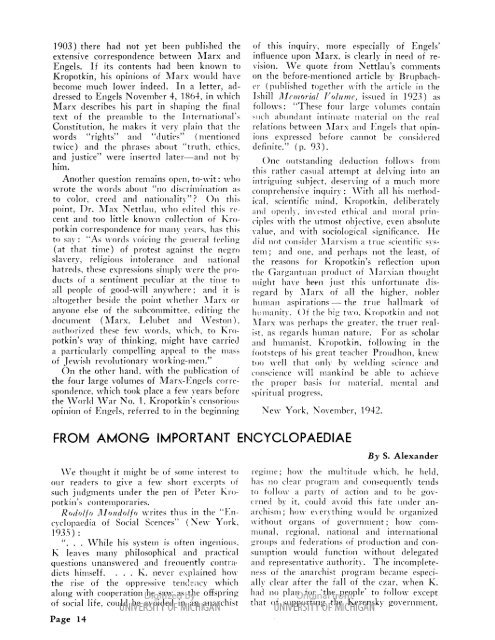Centennial Expressions on Peter Kropotkin 1842-1942.
Centennial Expressions on Peter Kropotkin 1842-1942.
Centennial Expressions on Peter Kropotkin 1842-1942.
You also want an ePaper? Increase the reach of your titles
YUMPU automatically turns print PDFs into web optimized ePapers that Google loves.
1903) there had not yet been published the<br />
extensive corresp<strong>on</strong>dence between Marx and<br />
Engels. If its c<strong>on</strong>tents had been known to<br />
<strong>Kropotkin</strong>, his opini<strong>on</strong>s of Marx would have<br />
become much lower indeed. In a letter, addressed to Engels November 4, 1864, in which<br />
Marx describes his part in shaping the final<br />
text of the preamble to the Internati<strong>on</strong>al's<br />
C<strong>on</strong>stituti<strong>on</strong>, he makes it very plain that the<br />
words "rights" and "duties" (menti<strong>on</strong>ed<br />
twice) and the phrases about "truth, ethics,<br />
and justice" were inserted later-ald not by<br />
him.<br />
Another questi<strong>on</strong> remains open, to-wit: who<br />
wrote the words about "no discriminati<strong>on</strong> as<br />
to color, creed( and nati<strong>on</strong>alit'v" On this<br />
point, Dr. Max Nettlau, who edited this recent and too little known collecti<strong>on</strong> of <strong>Kropotkin</strong> corresp<strong>on</strong>dence for many years, has this<br />
to sa: ''As w(ords voicing the genleral feeling<br />
(at that time) of protest against the negro<br />
slavery, religiouls intolerance and n ati<strong>on</strong>al<br />
hatreds, these expressi<strong>on</strong>s simply were the products of a sentiment peculiar at the time to<br />
all people of good-will anywhere; and it is<br />
altogether beside the point whether ~larx or<br />
any<strong>on</strong>e else of the subcommittee, editing the<br />
document (Marx, Lelubet and<br />
\Vest<strong>on</strong>r),<br />
authorized these few words, which, to <strong>Kropotkin</strong>'s vay of thinking, might have carried(<br />
a particularly compelling appeal to the mass<br />
of Jewish revoluti<strong>on</strong>ary working-men."<br />
On the other hand, with the publicati<strong>on</strong> of<br />
the four large volumes of Marx-Engels corresp<strong>on</strong>dence, which took place a few years before<br />
the WVorld War No. 1, <strong>Kropotkin</strong>'s censorious<br />
opini<strong>on</strong> of Engels, referred to in the beginning<br />
of this inquiry, more especially of Engels'<br />
influence up<strong>on</strong> Marx, is clearly in need of revisi<strong>on</strong>. We quote from<br />
Nettlau's comments<br />
<strong>on</strong> the before-menti<strong>on</strong>ed article by Brupbacher (published together with the article in the<br />
Ishill IAlemnorial VFolume, issued in 1923) as<br />
follows: "These four large volumes c<strong>on</strong>tain<br />
sochl abundait intimate material <strong>on</strong> the real<br />
relati<strong>on</strong>s between Marx and lEngels that opini<strong>on</strong>s expressed before cannot be colsidlered<br />
definite." (p. 93).<br />
One outstanding dediuctiol follows from<br />
this rather casual attempt at delving iiito an<br />
intriguing subject, deservinig of a much more<br />
comprehensive inquiry: With all his iLethodical, scientific mind, <strong>Kropotkin</strong>, deliberately<br />
and dopen ly, invested ethical and moral principles with the utmost objcctive, even absolu te<br />
value, and with sociological significance. liHe<br />
did niit c<strong>on</strong>sider \arxism a true scientific svsteim; and <strong>on</strong>e, and perhaps not the least, of<br />
the reas<strong>on</strong>s for <strong>Kropotkin</strong>'s reflecti<strong>on</strong> up<strong>on</strong><br />
the Garigantuan product of Alarxian thought<br />
might have been just this unfortunate disregardl by \larx of all the higher, nobler<br />
hu11 an aspirati<strong>on</strong>s - the true hallmark;of<br />
lu:manitv. Of the big two, l<strong>Kropotkin</strong> and niot<br />
Mlarx was perhaps the greater, the truer realist, as regards human nature. For as scholar<br />
a;n humanist, <strong>Kropotkin</strong>, followingv in the<br />
footsteps of his great teacher Proudh<strong>on</strong>, knew<br />
to() well that o<nly by welding science and<br />
c<strong>on</strong>science will 11ankind be able to achieve<br />
the proper basis for material, mental and<br />
spiritual progress.<br />
New York, November, <strong>1942.</strong><br />
FROM AMONG IMPORTANT ENCYCLOPAEDIAE<br />
\Ve thought it might be of some interest to<br />
our readers to give a few short excerpts of<br />
such judgments under the pen of <strong>Peter</strong> Kro-,<br />
potkin's c<strong>on</strong>temporaries.<br />
Rodolfo JlI<strong>on</strong>dolfo writes thus in the "Encyclopaedia of Social Scences" (New York,<br />
1935):<br />
".4.. \Vhile his systemn is often ingenious,<br />
K leaves many philosophical and<br />
practical<br />
questi<strong>on</strong>s unanswered and freouently c<strong>on</strong>tradicts himself.... K. never explained how<br />
the rise of the oppressive tendency which














![The Philosophy of Progress [pdf]](https://img.yumpu.com/14077359/1/190x245/the-philosophy-of-progress-pdf.jpg?quality=85)

